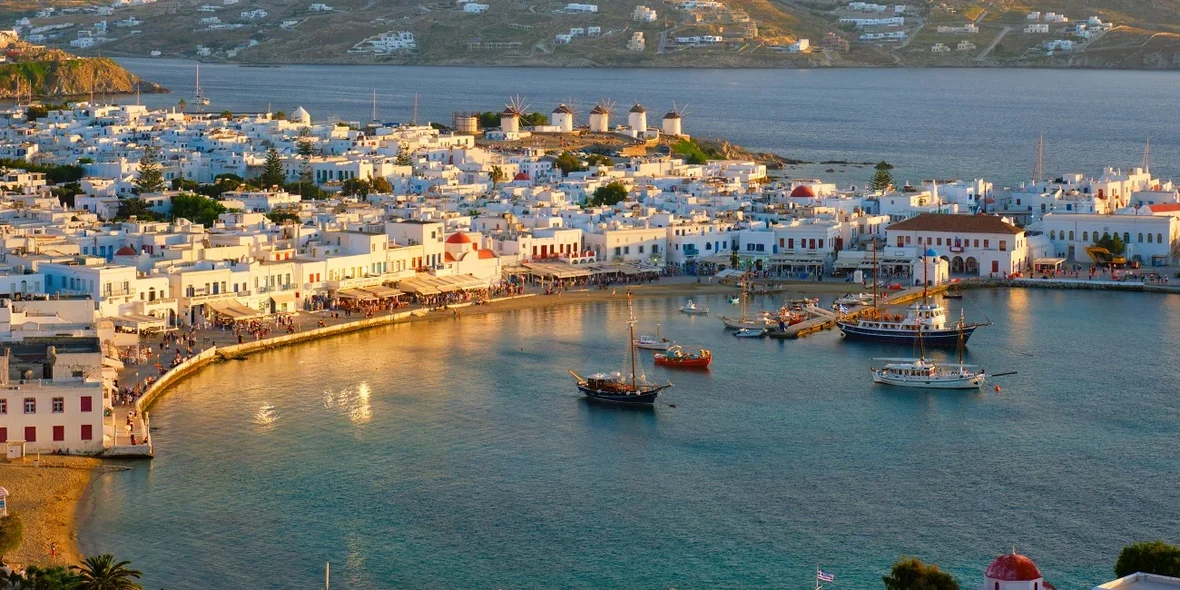
Top Perspective Cities in Greece for Permanent Residence
Greece is one of the most remarkable countries when it comes to historical and cultural heritage, climate, and scenic beauty. Known as the land of olive groves and luxurious beaches, leading travel agencies rightfully rank it among the most beautiful in the world. Greece is also recognized for having the best climate on the planet, with hot, dry summers and mild, wet winters, though there are slight variations depending on the specific city.
Life in Greece offers many appealing aspects that make it an attractive destination for relocation. The locals are known for their hospitality, and the rich culture and traditions allow you to feel part of something grand and ancient. However, the standard of living in Greece can be affected by economic fluctuations, with varying quality of public services and employment opportunities depending on the region.
Overall, Greece has a well-developed healthcare system, low crime rates, excellent cuisine, and a favorable environmental situation. In our article, we will explore the top cities in Greece, discussing the pros and cons of living there, to help you find out the best place to live in Greece as an expat.
Greece in Details
Greece is a small country in Southern Europe with a population of approximately 10.4 million as of 2024, the majority of whom are ethnic Greeks. The landscape is predominantly mountainous, with notable peaks like Mount Olympus (2917 meters) and Mount Parnassus (2457 meters). Greece is home to over 6000 islands, of which about 227 are inhabited, accounting for around 20% of its territory. This contributes to Greece having one of the longest total coastlines in the world, approximately 13,676 kilometers.
Greek beaches are renowned for their cleanliness, with many being awarded the “Blue Flag” distinction. The cleanest beaches are found on the islands of Crete, Corfu, and Rhodes, as well as the Peloponnese and Halkidiki peninsulas. Forests cover about 30% of the country’s territory.
Greece's economy continues to develop, with industry contributing around 16% to the national budget, tourism about 20%, agriculture approximately 4%, and the service sector making up the largest share at around 60%. As of 2024, the average monthly salary after tax is about €1277.
The climate varies in different areas of Greece, from temperate in the north to subtropical in the south. The official currency is the euro, as Greece is a member of the European Union. The official language is Modern Greek, with various regional dialects. In popular tourist destinations and major cities like Athens, English is widely spoken, especially among the younger population.
Orthodox Christianity is the state religion, but there are also communities of Muslims, Catholics, Protestants, and other faiths. For short-term visits to Greece, a Schengen visa type C is required, while long-term stays require a type D visa.
The average life expectancy in Greece is higher than the EU average, with women living around 84 years and men about 78 years. Scientists attribute this to the favorable climate and diet.
While statistics paint a positive picture, the accuracy of these figures can only be fully appreciated by immersing oneself in Greek culture and daily life. There are less pleasant aspects of living in Greece, such as bureaucracy. You can learn more about these various factors from our interview-based article, which covers personal experiences of living in both mainland and island Greece.
Athens: the Country's Calling Card
Athens is the historical, cultural, economic, and political center of the country. Athens offers a unique blend of ancient history and modern urban life. For about 3 million people living in Athens, the city's rich cultural heritage, iconic landmarks, and vibrant street life are part of their everyday experience. Most expats consider Athens one of the best places to live in Greece.
Athens has a well-developed transportation infrastructure. The Athens International Airport, “Eleftherios Venizelos,” is the main aviation hub of Greece and one of the largest in Europe. Located approximately 20 kilometers east of the city center, the airport is directly connected to Athens via:
- The third metro line (Blue Line), which goes directly to the city center.
- Suburban trains (Proastiakos), which connect the airport to the central Larissis station, provide routes to Corinth, Halkida, and other cities.
- Bus services, including routes to the central bus stations of other cities.
Larissis station is the intersection of all the country’s rail arteries, providing connections to other cities and regions, excluding the islands. The station is also connected to the metro and serves as a hub for intercity and suburban trains.
For connections to the numerous islands, there is the Port of Piraeus. Ferries from here depart for islands including Crete, Rhodes, Santorini, and Mykonos. All three hubs are linked by different metro lines and are accessible by both rail and bus transport.
Athens’ infrastructure is actively developing. One of the most ambitious projects is the expansion of the metro system with the construction of a new line by 2028. There are also plans to expand Athens Airport, although the planning horizon is very long, with the project expected to be completed by 2046.
Real Estate
In 2024, the real estate market in Athens continues to show positive trends. Property prices in central areas and popular tourist zones are rising due to increased demand from both local residents and foreign investors. On average, the cost per square meter of residential property in Athens is around €2000–3500, depending on the district and type of property:
- Central areas of Athens: approximately €3043 per square meter.
- Northern areas: approximately €2846 per square meter.
- Southern areas: approximately €3750 per square meter.
- Western areas: approximately €1909 per square meter.
- Eastern areas: approximately €2133 per square meter.
- Piraeus: approximately €2471 per square meter.
Labor Market
As the capital of Greece, Athens is the country's main economic and business hub. The city is home to offices of major international companies, financial institutions, government organizations, and service sector establishments. The economic sectors offering the most job opportunities include tourism, information technology, finance, education, and healthcare.
Average salaries in Athens vary depending on the sector and position. As of 2024, the average salary after taxes is around €1300. In the IT sector, as well as in finance and law, salaries can significantly exceed this level, reaching €2000–3000 or more.
Leisure and Recreation
Athens offers a wide range of opportunities for leisure and recreation. The city is rich in historical and cultural landmarks, such as the Acropolis, the Ancient Agora, and the Parthenon. Numerous museums, theaters, and art galleries provide extensive opportunities for cultural enrichment.
The city is also known for its cafés, restaurants, and nightlife, especially in areas like Gazi, Kolonaki, and Plaka. For those who enjoy outdoor activities, there are beaches in the southern suburbs, such as Glyfada and Vouliagmeni, as well as hiking trails and parks.
Education
Athens offers a wide range of educational institutions, including public and private schools, universities, and specialized institutes, such as the University of Athens and the National Technical University of Athens. For foreigners, there are international schools available, such as the American Community Schools of Athens and St. Lawrence College, which offer curricula in English.
Quality of Life
The quality of life in Athens varies depending on the area of residence. Central districts offer more amenities and access to cultural and historical sites, but they are also noisier. Suburban areas like Kifisia and Vouliagmeni offer a quieter atmosphere, better environmental conditions, and more green spaces, though they tend to be more expensive. Kolonaki and Glyfada are considered some of the best places to stay in Athens.
In summary, the pros and cons of moving to Athens include:
Pros:
- The housing market in the capital is well-developed. Apartment sales in Athens are among the most active in the country, offering a wide selection of properties.
- Moving to Athens for permanent residence is much easier compared to other cities.
- The education system is well-developed.
- The average salary is around €1300, with a minimum of €910 per month. Qualified professionals can expect to earn an average of €2200.
- The capital of Greece is popular with tourists year-round. This provides an opportunity to earn income from renting out properties without seasonal fluctuations, but it also means constant noise and crowds.
Cons:
- The bustling life of a metropolis and crowds of tourists are not for everyone, and the transportation system is often overloaded.
- The environmental situation is not the best, with smog occasionally appearing.
- Finding a job can be challenging, especially without language skills and high qualifications. Many people come here for work from different parts of Greece and other countries. The main sectors for employment include trade, services, tourism, and property rental (rent for a studio starts at around €550 per month). Many also work in industries such as food, chemical, and metallurgical production.
- Summers are hot, with temperatures reaching up to +40°C.
- Apartments and houses for sale in Athens are often priced high. The cost of groceries is also quite substantial.
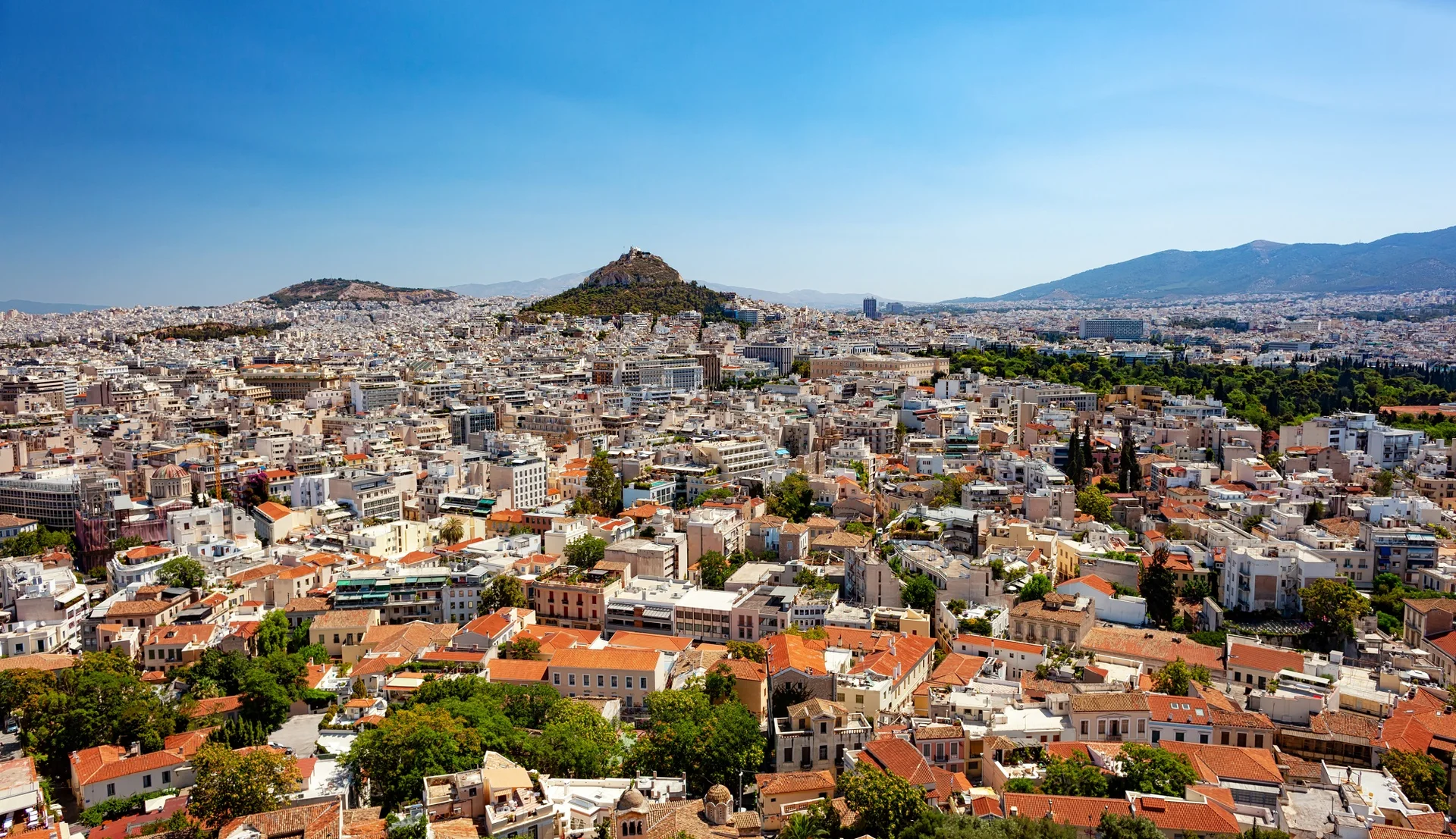
Thessaloniki: a Quiet, Peaceful Option
Thessaloniki is the second-largest city in Greece. Located in the Macedonia region in the north of the country, Thessaloniki has a climate that is moderately continental, and in the mountainous areas, alpine, making it milder than the Mediterranean climate of Athens.
Despite being the second-largest metropolis in the country, Thessaloniki has a much smaller population. Including its suburbs and satellite towns, the entire metropolitan area has about 1.1 million residents, which is three times less than Athens.
Thessaloniki’s transportation infrastructure is one of the city's strengths. Public transport is well-developed, including express routes that connect important points in the city such as the city center, universities, and major shopping centers.
The New Thessaloniki railway station is the central transportation hub connecting Greece. Despite its name, it was built in 1961 and handles both passenger and freight trains from across Europe.
Macedonia International Airport is located just 15 km south of the city and is the second-busiest airport in Greece. Both the airport and the railway station can be reached by bus, taxi, or car.
As Thessaloniki is situated on the coast of the Aegean Sea, the city has a large port of the same name. It accommodates cruise ships and ferries, connecting the city with other parts of Greece and the Mediterranean.
However, despite this diverse logistics network, traffic congestion in Thessaloniki remains intense, especially during peak hours. High hopes are placed on the metro to solve the traffic problem. The main metro line is expected to be operational in the second half of 2024.
The metro is expected to serve up to 315,000 passengers daily and reduce the number of cars on the city's roads by 60,000. These are impressive figures, considering that Thessaloniki’s population is only 320,000 people.
Real Estate
The average cost per square meter of housing in various areas of the city varies depending on the location and type of property. In the central district of Thessaloniki, the cost per square meter is around €2430. This reflects a 13% increase compared to the same period last year, when the price was €1869 per square meter.
In the suburbs, the average price per square meter is €1832, also showing an increase of 11% compared to 2023. In other areas of the Thessaloniki prefecture, prices vary, with the lowest average cost recorded at €1006 per square meter.
Labor Market
The most in-demand professions in Thessaloniki are programmers, engineers, managers, and healthcare specialists. Average salaries vary depending on the industry and level of experience. As of 2024, the average annual salary in Thessaloniki is approximately €31,530, which is equivalent to about €2627 per month before taxes.
Leisure and Recreation
Thessaloniki is known for its historical landmarks and museums, such as the White Tower, the Archaeological Museum, the Rotunda of St. George, and the Museum of Byzantine Culture. Notable cultural events include the Dimitria Festival, held in the fall, and the Thessaloniki International Film Festival.
Local restaurants and cafés offer seafood dishes and traditional Greek delicacies such as souvlaki and gyros. The Ladadika district is famous for its numerous taverns and restaurants, while the Valaoritou district is known for its vibrant nightlife with plenty of bars and clubs.
Education in Thessaloniki
Thessaloniki is an important educational center in Greece, home to Aristotle University and the University of Macedonia. The city also has both public and private schools, many of which offer instruction in multiple languages, including English.
Standard of Living
Thessaloniki offers a high quality of life due to its combination of a low cost of living, high standards of healthcare and education, cultural richness, and a favorable environmental situation. The cost of living is relatively lower than in most major European cities.
As of 2024, the average rent for housing is around €600–800 per month for a studio apartment. Prices for groceries and services are also lower than in other European capitals. For example, a meal at an inexpensive restaurant costs around €10–15, and a monthly public transport pass is about €30.
Healthcare is of a high standard. The city has both large hospitals and specialized medical centers. The level of medical care is comparable to other European countries, while the cost of medical services is often lower.
Thessaloniki is considered a safe city with a low crime rate. The environmental situation in the city is also improving due to efforts to reduce air pollution and develop green spaces.
Pros and cons of living in Thessaloniki:
Pros:
- Thessaloniki is located on the northern coast of Greece, along the Aegean Sea. In summer, temperatures typically range from +25 to +30 °C.
- Due to less traffic and industry, the air in Thessaloniki is cleaner compared to Athens.
- Education is open to foreign students, including programs in English.
- Renting a studio apartment in the city center costs between €600 and €800 per month, and outside the center, it’s around €450 per month, making it more affordable than in Athens.
- Thessaloniki is known for its cultural events, museums, and historical landmarks. The city offers a vibrant nightlife, numerous restaurants and cafés, as well as various festivals and events.
Cons:
- Thessaloniki is not a traditional resort city, which makes real estate less attractive for tourists to rent. However, property can be profitably resold to those looking for permanent residence.
- The cost of gasoline in Thessaloniki is high, making car ownership expensive. Many residents prefer to use public transport or bicycles, for which the city has good infrastructure.
- Finding a high-paying job can be more challenging, especially in certain sectors of the economy. Despite the availability of vacancies, competition for some positions remains high.
- In some parts of the city, there may be infrastructure issues, such as traffic congestion during peak hours and a lack of parking spaces.
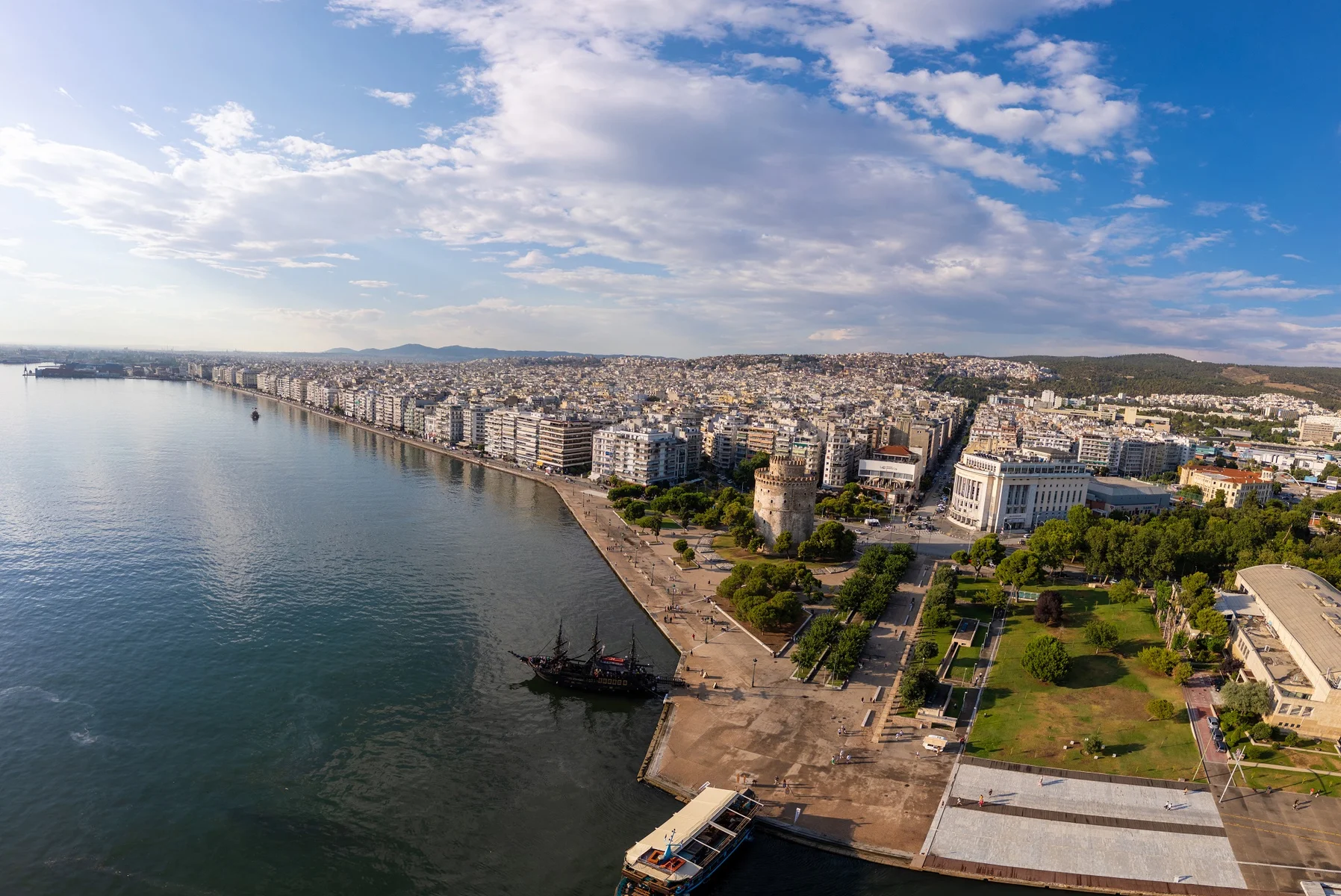
Heraklion: the Benefits of Living on the Island of Crete
Heraklion, also known as Heraklion, is the largest city and administrative center of the island of Crete, one of the largest and most famous Greek islands, with a population of about 174,000 people. The city has a rich history dating back to the Minoan civilization, when the famous Knossos Palace was located here. Heraklion combines ancient ruins with modern architecture, creating a unique atmosphere for both residents and tourists.
Crete does not have a railway network, so the main form of public transportation in Heraklion is buses. The routes cover the entire city and nearby settlements. Road transport connects Heraklion with other cities on Crete, such as Chania, Rethymno, and Agios Nikolaos, as well as with the island’s main tourist attractions.
Heraklion Airport is located just 5 km from the city center and can be reached by bus, taxi, or car. The Port of Heraklion serves passenger ferries, cruise ships, and cargo vessels. Ferries connect Heraklion with Athens (Piraeus port), other Aegean islands, and mainland Greece.
Real Estate
As of June 2024, the average price for residential property in Heraklion is around €1726 per square meter. This is slightly below the average for Crete, where prices range from €1800 to €2400 per square meter. The average rental cost is approximately €8.87 per square meter per month. This figure is somewhat higher than the average but remains affordable compared to other popular Greek regions.
Labor Market
In Heraklion, the average annual income is around €28,128, which is equivalent to approximately €2344 per month before taxes. The most in-demand professions are specialists in tourism and hospitality, pharmacists, engineers, and architects. The demand for workers in the tourism industry is particularly high during the summer season.
Leisure and Recreation
Heraklion is known for its cultural events, such as the Heraklion Summer Festival, which features concerts and theater performances, and the Wine Festival in Archanes, which attracts wine and gastronomy enthusiasts.
The city life in Heraklion is vibrant and diverse. There are many restaurants and cafés where you can try traditional Cretan dishes such as dakos and kalitsounia. Heraklion’s nightlife is also lively, with numerous bars and nightclubs, especially in the city center and along the waterfront.
For active leisure enthusiasts, sea excursions to nearby islands are popular, and the city’s beaches offer opportunities for water sports such as diving and windsurfing.
Education
One of the main educational institutions is the University of Crete, with campuses located in Heraklion and Rethymno. It is considered one of the top universities in Greece. The Technological Educational Institute of Crete, also located in Heraklion, offers programs focused on applied sciences and technology. It has strong ties with local industry and the economy, providing students with opportunities for practical training and internships.
Quality of Life
The cost of living in Heraklion is comparatively lower than in major mainland cities like Athens and Thessaloniki, which makes the city one of the best places in Crete for families. The average rent for a studio apartment in the city center is around €400–500 per month.
The city has both public and private clinics offering a wide range of medical services. The University Hospital of Heraklion is one of the leading medical institutions on Crete.
Pros and cons of living in Crete:
Pros:
- Pleasant coastal climate without extreme fluctuations (up to +20–30 °C in summer) and excellent environmental conditions.
- The housing market is well-developed, with a prevalence of villas and townhouses, although other types of housing may be harder to find.
- An active and developed Russian-speaking community (though most are on vacation rather than permanent residents).
- Good infrastructure.
Cons:
- Finding a job in Heraklion, as well as other parts of Crete, is very difficult—much more challenging than on the mainland. Newcomers are usually employed in entertainment, tourism, and service sectors, but competition is high.
- Heraklion's economy is heavily dependent on tourism, leading to an uneven standard of living due to seasonal income fluctuations.
- Transportation links to the mainland are only available by air or sea.
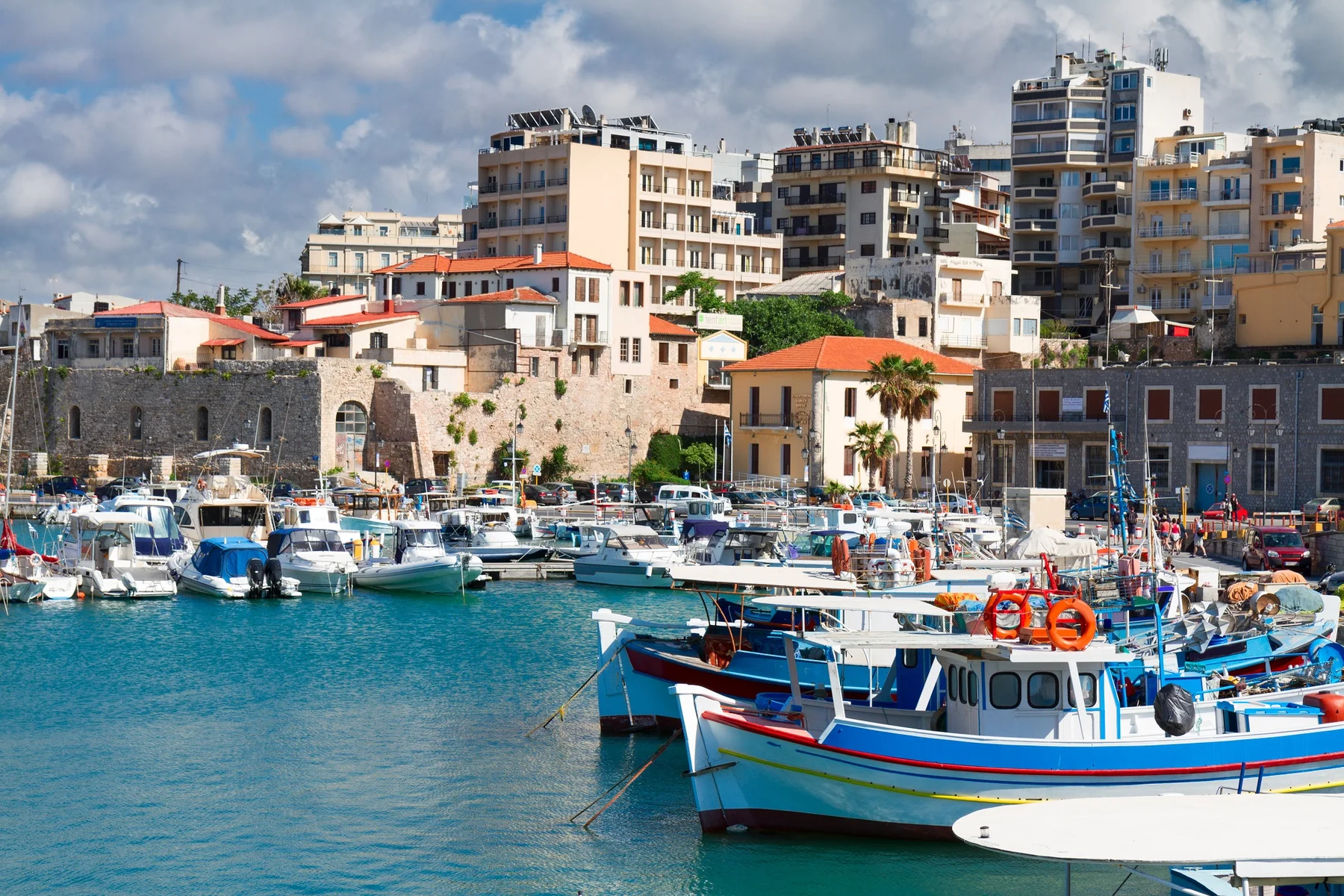
Rhodes: a Resort City With its own Atmosphere
Rhodes is the largest island of the Dodecanese archipelago, located in the southeastern Aegean Sea. The island's main administrative and economic center is the city of Rhodes.
Historically, Rhodes is famous as the site of one of the Seven Wonders of the Ancient World, the Colossus of Rhodes. The island is renowned for its well-preserved medieval architecture, including the Palace of the Grand Master, fortified walls, and the narrow streets of the old town, which is a UNESCO World Heritage Site.
As in Heraklion, buses are the primary form of public transportation on the island. The bus network covers the city area, major towns, and popular tourist destinations such as Lindos, Faliraki, and Kamiros. Taxis are also available in key tourist zones. The island is accessible by sea or air, with the main airport located 14 km southwest of the city of Rhodes.
The main city port accommodates cruise ships, ferries, and private yachts, connecting Rhodes with mainland Greece (Athens, Piraeus) and other islands in the Dodecanese and Aegean Sea. Additionally, there are several smaller ports and marinas, such as Mandraki Marina, serving local and international yachts and sailing vessels.
The key transportation hubs of Rhodes are well-connected. Bus routes link the airport with the city of Rhodes and other major points on the island, including the port.
Real Estate
As of 2024, the average price per square meter for housing in Rhodes is around €2100 in the city center, with higher prices in coastal areas. The average rental cost is approximately €8.75 per square meter per month. Rental demand is particularly high during the tourist season, leading to increased prices.
Labor Market
The average annual salary in Rhodes is around €30,844, which equates to approximately €2570 per month before taxes. The labor market in Rhodes, like the rest of Greece, is heavily dependent on the tourist season. During the summer, there is a sharp increase in demand for workers in the hospitality and restaurant industries. Outside of the tourist season, the number of job openings decreases, but there remains a steady demand for professionals in fields such as education, healthcare, and IT.
Leisure and Recreation
Rhodes offers a wide selection of beaches with clean water and various amenities. Elli Beach and Faliraki are among the most popular spots for relaxation. Marine activities include diving, snorkeling, windsurfing, and yachting, with several diving centers operating on the island.
Every September, the island hosts the Rhodes Quinta Festival, featuring classical music concerts, theater performances, and art exhibitions. Additionally, in July, the Rhodes International Film Festival attracts filmmakers and audiences from around the world.
Education
Rhodes does not have major universities, which forces students seeking higher education to go to the mainland. However, the city has several branches and educational centers of major Greek universities, specializing in tourism management and other disciplines related to the island's main economic sectors.
Rhodes Town is the best area to stay in Rhodes for first-time visitors, with its blend of history and modern amenities. The Old Town offers a medieval atmosphere with landmarks like the Palace of the Grand Master, while the New Town provides modern shops, restaurants, and nightlife options. It’s also the best base for exploring the island without a car due to its well-connected bus system.
Standard of Living
Healthcare in Rhodes is of a high standard. The island has both public and private clinics. The public hospital of Rhodes and several private clinics provide quality medical care. In emergency cases, patients can be transferred to specialized medical facilities on the mainland.
Pros and cons of living in Rhodes:
Pros:
- Rhodes has a mild climate with warm summers and mild winters, with an average annual temperature of around 20 °C.
- The cost of living in Rhodes is lower than in major Greek cities like Athens.
- The island has sufficient medical facilities to meet the needs of its residents.
- Rhodes is considered a safe place to live, with a low crime rate.
Cons:
- Rhodes lacks major universities, forcing students to relocate to other cities for higher education.
- During the summer, demand for labor in the hospitality and restaurant industries increases sharply, but the number of job vacancies decreases outside of the tourist season.
- Despite having a well-developed transportation network, road and public transport congestion can be an issue during peak tourist seasons.
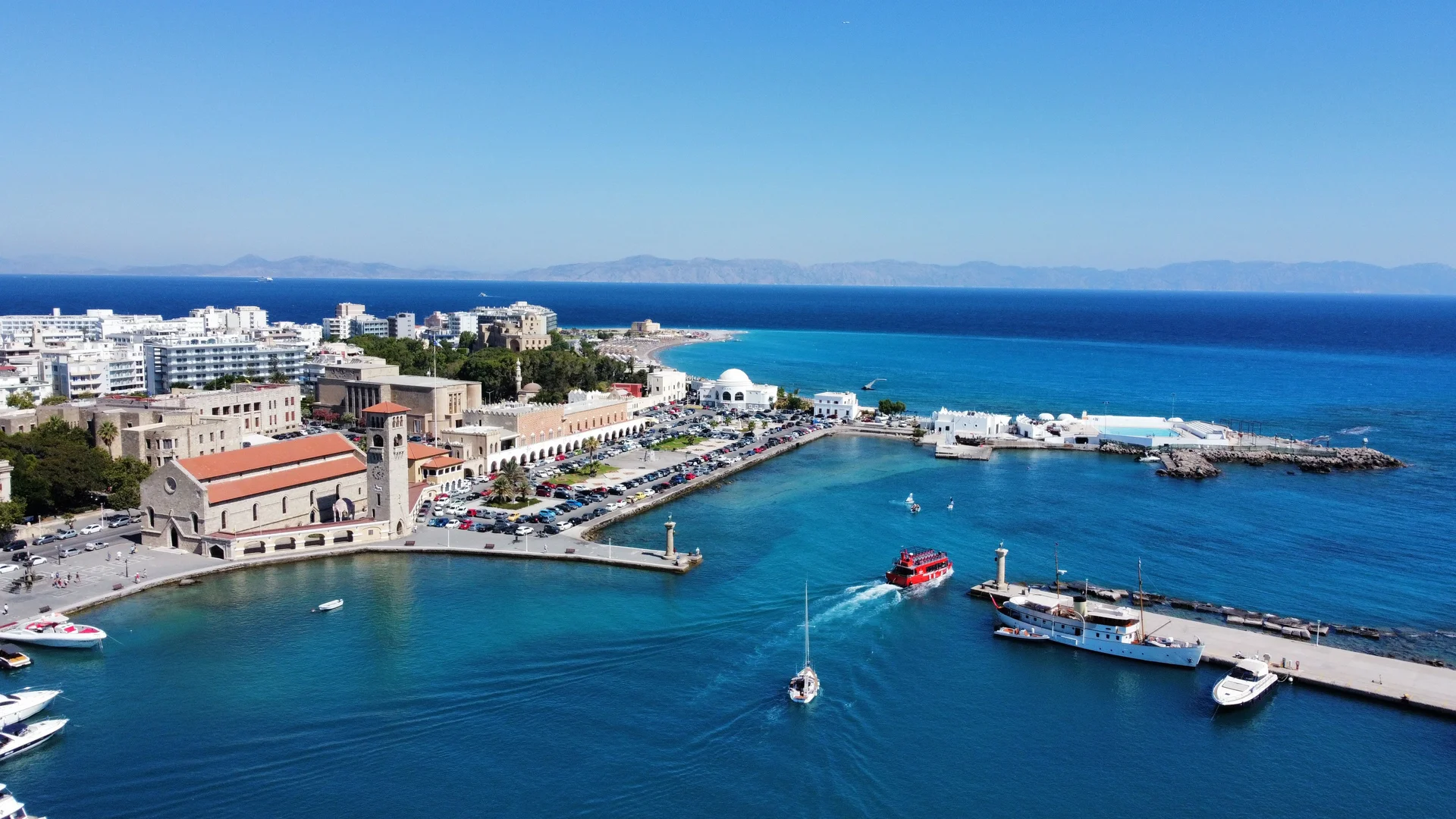
Larissa: a Quiet Life in the Lap of Nature
Larissa is a major city in central Greece and the capital of the Thessaly region. The city is known for its archaeological sites, such as the ancient theater and Roman forum, as well as its green parks, including Alcazar Park and the recreational area along the Pinios River. While Greece's coastal areas are often seen as a place for living, Larissa is a city for work.
The economy of Larissa is based on agriculture, industry, and trade. The city is a hub for the region's agribusiness, producing grains, vegetables, and fruits. Larissa also has a well-developed textile, food, and construction industries.
Buses are the main form of public transportation in Larissa, with routes covering both the city and its suburbs. Taxis are widely available at reasonable prices, and those with a driving license can rent a car, which is popular among tourists looking to explore the surrounding areas and the Thessaly region. Bike rentals are also available, and the city boasts an extensive network of bike lanes.
Larissa is situated between Thessaloniki and Athens, and a major railway line runs through it, making the city an important logistics hub. The railway station and bus terminals are centrally located, providing easy access to public transportation, taxis, and major roads connecting the city to nearby towns and tourist attractions.
However, the airport situation is less convenient, as it is located 53 km from the city. Although it is connected by bus services and special express routes, the distance can be a drawback, especially when taking a taxi to the airport.
Real Estate
In Larissa, the average selling price for residential real estate is €1,174 per square meter. The cost of renting is also relatively low, with an average rental price of around €7.31 per square meter per month.
These prices are influenced by several factors, the most significant being the city's lack of direct access to the sea. Consequently, tourist activity in Larissa is lower compared to other popular regions of Greece. Another factor is the relatively low wage levels, which contribute to Larissa being an industrial city with well-developed residential areas and a stable, though lower-wage, economic environment.
Labor Market
The labor market in Larissa is characterized by a variety of job opportunities in sectors such as agriculture, industry, education, and services. There is a high demand for skilled tradespeople and workers with experience in logistics.
Average salaries in Larissa are lower than in Athens and Thessaloniki, which may be partly due to the city's lesser economic significance at the national level. A significant portion of jobs are in agriculture and industry, where wages are traditionally lower compared to high-tech and financial sectors.
Leisure and Recreation
One of the main attractions in Larissa is the ancient theater, built in the third century BC, which could seat around 10,000 spectators. The Roman forum, where excavations are ongoing, also holds interest for history enthusiasts.
The city's 8000 years of history can be explored in Larissa's numerous museums, with the Archaeological Museum of Larissa being the largest. It houses artifacts from the Thessaly region, covering periods from the Neolithic to Roman times.
Larissa is also known for its cultural events and festivals. Each year, the city hosts theater performances, music festivals, and exhibitions that attract both locals and tourists.
Education
Public schools in Larissa offer free education. Their curricula align with Greece's national standards and include mandatory study of Greek language, mathematics, natural sciences, and humanities.
The main higher education institution in the city is the University of Thessaly, which offers a wide range of undergraduates, master's, and doctoral programs across disciplines such as science, engineering, agriculture, humanities, and social sciences.
Standard of Living
Larissa is well-suited for those planning to move to Greece for work, especially if they are not seeking high-paying positions. This is due to the relatively low cost of housing and modest salary levels. Additionally, the city is not a major tourist destination and is industrially developed.
Pros and cons of living in Larissa:
Pros:
- Despite the smaller population, the city's infrastructure is well-developed.
- Larissa ranks first in Greece for the number of green spaces, which helps offset the environmental impact of industrial activities.
- The transportation situation is good, especially in terms of rail and road connections.
- Studio apartments can be rented for as low as €350 per month.
- For those who speak the language and have the necessary qualifications, there are job opportunities in skilled trades.
Cons:
- Lack of direct access to the sea.
- There are fewer tourist activities compared to other Greek cities.
- Relatively low salary levels, especially when compared to Athens.
- The climate is moderately continental, with hot summers and cold winters.
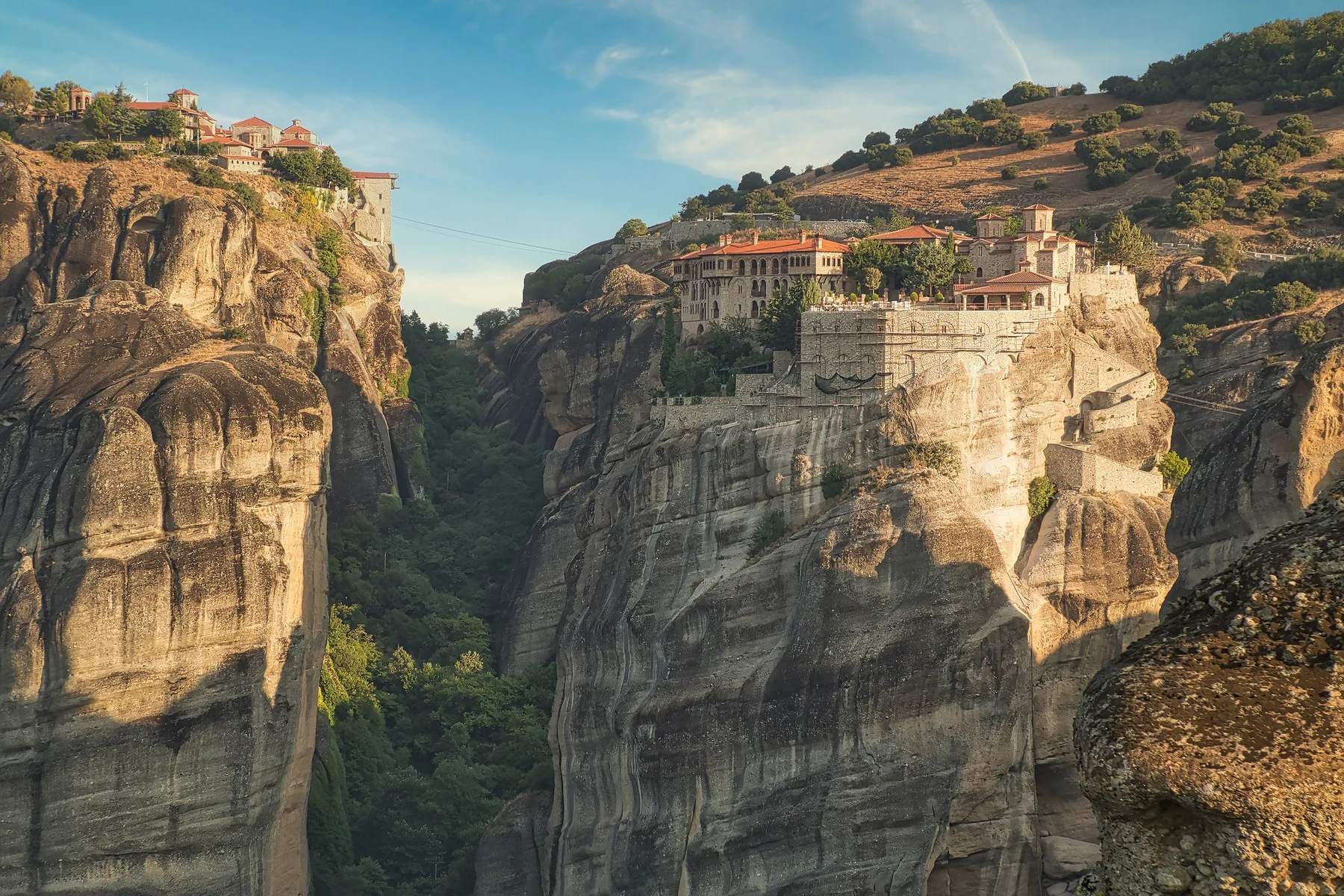
Where is it Better to Live — in a Big City or a Small Town?
When moving to Greece for permanent residence, the first step is often purchasing property. This process involves certain nuances and legal requirements, which is why we recommend consulting our step-by-step guide to buying real estate in Greece.
Homes for sale in Greece are available in both large and small cities, on the mainland and the islands. Some believe that the best cities to live in Greece are large mainland cities like Thessaloniki or Larissa. Others may prefer island cities like Rhodes and Heraklion. The choice is yours, as each option has its own unique features.
Smaller towns are good places to stay in Greece. They offer lower prices for housing and goods, less aggressive competition in the job market, low crime rates, and excellent environmental conditions. However, smaller towns have less developed infrastructure, slower development, limited services, and immigrants may stand out more compared to larger cities.
Islands also have their own features. During the off-season, there is almost no work, cities are half-empty, and many residents move to the mainland during this time. Finding many goods and services can become difficult or impossible as tourists leave.
Living in Greece has its pros and cons. But by considering these factors, everyone can decide which city to move to for permanent residence, ensuring that the transition to this sunny coastal country brings only happiness.
Author
I write informative articles about real estate, investments, job opportunities, taxes, etc.























